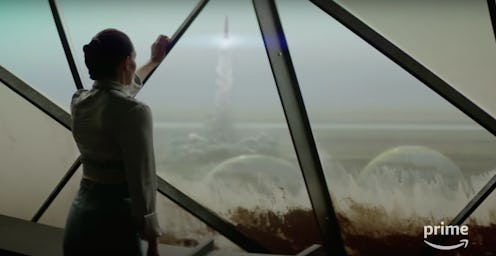There have, expectedly, been early connections drawn between Black Mirror and Philip K. Dick's Electric Dreams, a new Amazon series based on the titular author's seminal sci-fi short stories. It's a just comparison: Each of the shows are, at least partially, indebted to the other. Though Black Mirror was first to television, it seems improbable that it wasn't impacted, if indirectly, by Dick's writing. His work was largely under-appreciated during his lifetime, but has irrevocably shaped modern sci-fi, probing enduring themes of ethics, identity, and the blurred boundaries of reality.
The Twilight Zone, a noted influence for Black Mirror (producer: Annabel Jones) was the first series to adapt one of Dick's stories, and in the decades following his death in 1982, a dozen more re-imaginings have cropped up: Minority Report (2002), The Adjustment Bureau (2011), The Man In The High Castle, and most famously, the newly revived Blade Runner films (1982; 2017). In turn, Black Mirror has paved the way for Dick's brand of storytelling on-screen, plunging viewers into the same sort of futuristic, fantastical, and sometimes all-too-real worlds he first envisioned, but with fresh eyes and a new format. In many ways, the shows are similar, but they're also distinctly original; both facts that make Electric Dreams (executive producer: Katie DiMento) worth a watch. Here's why Black Mirror fans in particular should check it out:
1. It Has The Same Format
Like Black Mirror, Electric Dreams is an anthology, shifting its characters and narratives each episode. Unlike Black Mirror, that also includes a rotating creative team, which doesn't always play to its advantage, but should spark the same kind of fervent debate over which episodes work and which don't that Black Mirror fans are well accustomed to.
2. And A-List Cast
Black Mirror may have the likes of Jon Hamm and Jesse Plemons, but the Electric Dreams cast is just as stacked: Janelle Monáe, Anna Paquin, Greg Kinear, Steve Buscemi, and Bryan Cranston (who also executive-produces) are all among the stars featured in Season 1.
3. There Are More Episodes
Black Mirror is a rather intensive, elaborate undertaking, which means its seasons often come slim, but if you're still craving more after Season 4's six-episode whirlwind, Electric Dreams is your fix: It boasts 10 new vignettes to scratch your sci-fi itch.
4. It Will Make You Think
Much like its mind-warping peer, Electric Dreams will challenge you, underscoring its far-flung storytelling with philosophical meditations on what is means to be human in a world that feels intent on fracturing that very definition. Parsing the human psyche was a cornerstone of Dick's work.
5. The Future Is A Little Brighter
Though Black Mirror has let out the occasional happy ending, Electric Dreams lets a little more light into its darkness. Where Charlie Brooker's future is bleak, Dick's is, at least marginally, more bright.
6. It Leads With Emotion
When Electric Dreams does play into anxieties, it tends to aim for the heart, while Black Mirror generally sticks to technological scares.
7. The Endings Are Just As Unpredictable
Black Mirror likes its endings with a twist, and Electric Dreams like its left open. By the time the credits roll, you're often left without a finite answer about how the narrative resolved.
Overall, Electric Dreams is a little more cerebral than its counterpart. True to name, it sometimes feels like you're walking through a dream, or in other cases, have stumbled into someone else's. Save for a few exceptions, it doesn't operate within the same hellish dystopias as Black Mirror, and to that end, it probably won't dredge up the same sort of modern fears, but it's nonetheless a surreal, transportive watch. Black Mirror's crown is safe for now, but Electric Dreams makes for a promising dark horse.
